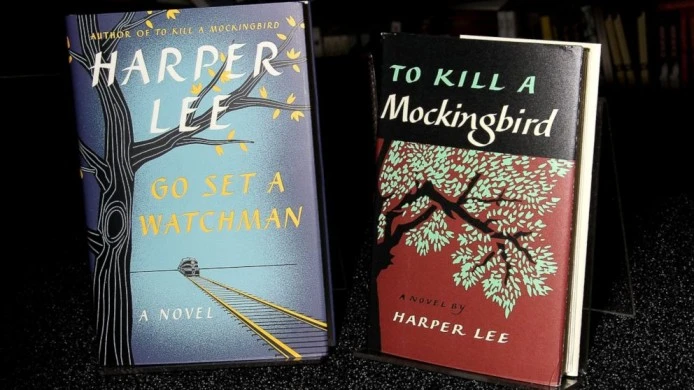What the Hell Are We Doing Lending Money to a Guy Like This?

DARK TOWERS
Deutsche Bank, Donald Trump, and an Epic Trail of Destruction
By David Enrich
Each era seems to have a bank emblematic of its excesses — in the 1980s, it was Drexel Burnham Lambert, the junk bond king; in the 2000s, it was Lehman Brothers.
The 2010s were different. No towering financial collapse marred the landscape; no Madoff or Enron blighted the business page. Yet never have good times felt so bad. In these early months of the next decade, America is prosperous but malcontent, solvent but anxious.
David Enrich, a former reporter with The Wall Street Journal and now the finance editor of The New York Times, has found, perhaps, the perfect vehicle for this murky, un-transparent moment. Name a banking scandal and Deutsche Bank was in the thick of it — interest rate manipulation, Russian money laundering, currency dealings with rogue states, the collapse of Italy’s (and the world’s) oldest bank, hidden derivative losses, a high-level suicide.
It would have been perfect had Deutsche bankrolled a shunned real estate mogul and made him king — and of course, they did that too, the one bank that lent to Donald Trump long after he had a reputation for stiffing its peers and for stiffing Deutsche itself.
No single thread connects these myriad scandals, but “Dark Towers” offers a compelling, if familiar, thesis: that unchecked ambition twisted a pillar of German finance into a reckless casino and fostered a culture in which amorality and, ultimately, criminality thrived.
[ This book was one of our most anticipated titles of February. See the full list. ]
Deutsche is intriguing not only because its leaders chased growth at any cost — resulting in mountains of losses, as it always does — but because it once was the emblem of European institutional lending, the near-opposite of Wall Street short-termism. Founded in Berlin in 1870, just before German unification, Deutsche saw its mission as advancing not just profits but German commerce in Europe and America. And over the next century — save for a nasty lapse under the Nazis, when it pressured corporate clients to rid themselves of Jewish directors — Deutsche did that well. As late as the 1980s, when Wall Street was preaching the glories of debt, Deutsche stood for stability, social as well as financial. It had no C.E.O. excesses because it had no C.E.O. It was run, consensually, by a vorstand (board), an arrangement designed to promote harmony with labor unions and industrial partners.
However, as the West deregulated markets, profits from trading soared. Wanting in on the game in 1995, Deutsche recruited Edson Mitchell from Merrill Lynch to expand its markets desk. Mitchell was a gunslinger who would wager $10,000 on a golf putt — arguably, not much riskier than the derivatives Merrill peddled to clients. Merrill was so good at peddling these unprotected market bets that one high-profile institutional client, Orange County, Calif., purchased enough to wind up in bankruptcy.
Seeking just this sort of expertise at Deutsche, Mitchell went on a hiring binge, snagging 2,500 traders and such from his former firm and others, which Enrich calls “one of the greatest migrations in Wall Street history.”
In no time, Deutsche’s center of gravity (and 85 percent of its profits) shifted to investment banking and trading. The bank’s formerly prudent style came to seem as dated as the dark oil portraits lining its corridors.
The thing about risk is, until it stops working it works rather well. As profits soared, Deutsche wanted more risk. It blithely quadrupled its balance sheet, swallowing Bankers Trust (which Enrich generously labels a third-rate firm) and purchasing a dicey mortgage shop at the peak of the bubble.
One telling moment in Deutsche’s evolution came when an executive bragged that they no longer needed “clients.” Why bother writing loans when you can trade derivatives? Another was when Josef Ackermann was anointed C.E.O. The Swiss-born Ackermann understood Wall Street all too well. He ran the bank for short-term profit and set a target of 25 percent on equity, the banking equivalent of driving 80 miles per hour on an icy road.
Troops got the message: Internal controls were scotched or ignored. It was a short step from taking outsize risks to fleecing customers — but when whistle-blowers reported concerns, they were shoved aside. Enrich recounts numerous examples. A trader named Christian Bittar was in line for a $100 million bonus; when this (unsurprisingly) prompted an internal review, Deutsche staged a whitewash and Bittar got his check. Enrich says the traders were “incentivized to engage in fraud.” Later, Bittar pleaded guilty to trying to rig a key interest rate.
One of the bank’s more troubling activities was laundering billions of Russian rubles (via sham transactions known as “mirror trades”) into U.S. dollars. Then there was client Trump. Enrich’s portrait isn’t new, but it makes for painful reading: the smooth persuasions, the obsequious flatteries, the lying about his net worth to garner loans for office buildings, resorts, casinos.
When Deutsche’s real estate team cut off Trump, private banking opened the spigot. When a loan came due, Trump had “no intention” of repaying, as if the rules for him were different. Deutsche’s brass was so in thrall to Trump’s celebrity, and so eager to expand in America, one division lent $48 million to cancel the debt on a Chicago skyscraper — a debt Trump had defaulted on with another wing of the same bank. They bought his pitch as voters would. In what could serve as a requiem for the country’s lost innocence, the general counsel said, “What the hell are we doing lending money to a guy like this?”
Enrich hangs his tale on the story of William Broeksmit, a derivatives trader and Mitchell’s pal and would-be protector. Broeksmit played the part of “superego” at the increasingly wayward bank, questioning risky trades and asking quaint questions such as “How does that help the client?” But he drank too much and suffered spells of darkness. He got bogged down in the legal and regulatory mire into which the bank was sinking. Eventually, Broeksmit hanged himself.
Broeksmit’s suicide elevated his usefulness as a narrative prop, perhaps more than Deutsche warranted. Enrich doggedly prowls the psychological shadows for clues about what might have driven him. He trails Broeksmit’s son, Val, who wasn’t close to his dad but who, after his death, embarks on a quest to find “answers” and to pin culpability on his father’s employer. Val gains access to his father’s email (and hacks into his mother’s credit cards) and shares the goods with journalists and investigators across Europe and America, often demanding money that he then spends on heroin and Oxy. This soap opera says much about the Broeksmits, less about Deutsche. To Enrich, the story shows that Wall Street lures good people “away from their moral and ethical principles.” However, he presents no evidence of Broeksmit acting immorally. He was, rather, a decent if imperfect banker who, as Enrich says, internalized his employer’s problems.
“Dark Towers” suffers some unfortunate tropes of business journalism: Val is “fueled” by Ritalin, traders are “fueled” by testosterone and “crazed” by adrenaline; the bank is “fueled” by greed. Perhaps “fuel” should be reserved for energy writers.
Enrich’s most tantalizing nugget is that in the summer of 2016, Jared Kushner’s real estate company (which received lavish financing from Deutsche) was moving money to various Russians. A bank compliance officer filed a “suspicious activity report,” but the report was quashed and she was fired. The suggestion that maybe the money was payback for Russian campaign meddling isn’t one that Enrich can prove. Similarly, we will have to wait to see if Deutsche can recover from years of banking malpractice that destroyed its capital and wiped out 95 percent of its stock price. In the meantime, Enrich has given us a thorough, clearly written and generally levelheaded account of a bank that lost its way.




